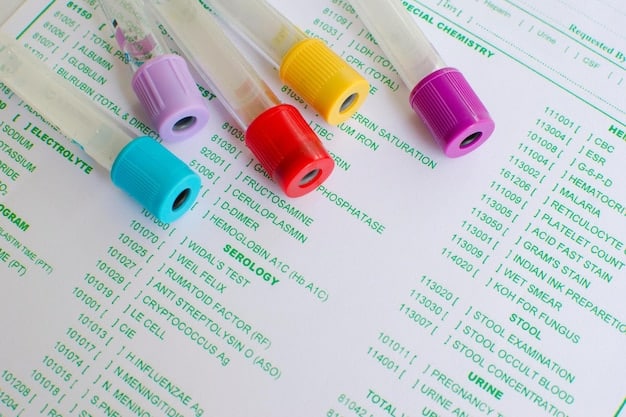How to Ace Your Standardized Test: US Student’s 2025 Guide

Anúncios
How to prepare for a standardized test in 2025 involves strategic planning, consistent study habits, and understanding the test format, ensuring US students maximize their scores through targeted preparation and effective time management.
Navigating the world of standardized tests can feel overwhelming, but with the right approach, you can confidently achieve your best score. How to prepare for a standardized test: A comprehensive guide for US students in 2025 is about more than just rote memorization; it’s about developing effective study habits and test-taking strategies.
Anúncios
Understanding Standardized Tests in the US
Standardized tests are a significant part of the US education system, often determining college admissions and scholarship opportunities. Understanding the purpose and format of these tests is the first step in effective preparation.
What are Standardized Tests?
Standardized tests are assessments administered and scored in a consistent manner. They are designed to evaluate a student’s knowledge and skills in specific areas, providing a uniform measure of academic achievement.
Anúncios
These tests serve various purposes, from college admissions to placement in specific academic programs. Recognizing their importance is crucial for high school students planning their future.

Common Standardized Tests for US Students
Several standardized tests are commonly used in the US. Each test has its own format, content, and scoring system. Here are some of the most prevalent ones:
- SAT (Scholastic Assessment Test): A widely recognized college admission test that measures skills in reading, writing, and math.
- ACT (American College Testing): Another popular college admission test that assesses skills in English, math, reading, and science, with an optional writing section.
- PSAT/NMSQT (Preliminary SAT/National Merit Scholarship Qualifying Test): Serves as practice for the SAT and a qualifying test for the National Merit Scholarship program.
- AP Exams (Advanced Placement Exams): Subject-specific tests that allow students to earn college credit while still in high school.
Familiarizing yourself with these tests and their specific requirements is vital for targeted preparation. The choice of which test to focus on, be it the SAT or ACT, often depends on individual strengths and college preferences.
Ultimately, understanding the landscape of standardized tests will empower you to create a tailored study plan and approach the test with confidence.
Creating a Study Plan
A well-structured study plan is essential for success. It provides a roadmap to guide your preparation, ensuring you cover all necessary topics and allocate sufficient time for each.
Assessing Your Strengths and Weaknesses
Begin by identifying your areas of strength and weakness. This self-assessment will help you focus your efforts where they are needed most. Diagnostic tests and practice exams can provide valuable insights.
Consider your past academic performance in relevant subjects and identify topics that consistently challenge you. This honest evaluation is the foundation for an effective study plan.
Setting Realistic Goals and Timelines
Establish achievable goals and timelines for your preparation. Break down the overall study process into smaller, manageable tasks. This approach makes the process less daunting and helps maintain motivation.
Set specific, measurable, achievable, relevant, and time-bound (SMART) goals. For example, aim to improve your math score by a certain number of points within a specific timeframe.

Choosing the Right Study Materials
Select study materials that align with your learning style and the specific requirements of the test. Official test preparation books, online resources, and tutoring services are all valuable options.
- Official Test Preparation Books: These books provide authentic practice questions and insights into the test format and content.
- Online Resources: Websites and apps offer interactive practice questions, video lessons, and personalized feedback.
- Tutoring Services: A private tutor can provide individualized attention and guidance, addressing your specific needs and challenges.
Selecting the right resources is crucial for effective learning. Consider factors such as cost, accessibility, and alignment with your learning preferences.
A well-crafted study plan provides structure and direction to your test preparation efforts. It helps you stay organized, focused, and motivated, ultimately increasing your chances of success.
Effective Study Techniques
Effective study techniques are crucial for maximizing your learning and retention. Experiment with different strategies to find what works best for you.
Active Recall
Active recall involves retrieving information from memory rather than passively rereading notes. This technique strengthens neural connections and improves long-term retention.
Try quizzing yourself on key concepts, creating flashcards, or summarizing information from memory. These activities force your brain to actively retrieve and process the information.
Spaced Repetition
Spaced repetition involves reviewing material at increasing intervals. This technique takes advantage of the forgetting curve, reinforcing learning before information is lost.
Use spaced repetition software or create a schedule for reviewing topics at increasing intervals. This approach optimizes learning and retention over time.
Practice Tests and Mock Exams
Practice tests and mock exams are essential for familiarizing yourself with the test format and content. They also provide valuable feedback on your progress and areas for improvement.
- Simulate Test Conditions: Take practice tests under timed conditions and in a quiet environment to mimic the actual test experience.
- Analyze Your Results: Review your answers and identify areas where you struggled. Focus your subsequent study efforts on these areas.
- Track Your Progress: Monitor your scores over time to gauge your improvement and identify trends.
Practice tests are a powerful tool for identifying gaps in your knowledge and improving your test-taking skills. They also help reduce test anxiety and build confidence.
By incorporating these effective study techniques into your preparation, you can significantly enhance your learning and improve your test performance.
Managing Test Anxiety and Stress
Test anxiety and stress can negatively impact your performance. Learning to manage these emotions is crucial for maintaining focus and confidence during the test.
Mindfulness and Relaxation Techniques
Mindfulness and relaxation techniques can help calm your nerves and reduce anxiety. Deep breathing exercises, meditation, and progressive muscle relaxation are all effective options.
Practice these techniques regularly, especially in the days leading up to the test. They can help you stay grounded and focused in the face of stress.
Positive Self-Talk
Positive self-talk involves replacing negative thoughts with positive affirmations. This technique can help boost your confidence and reduce self-doubt.
Challenge negative thoughts and replace them with positive statements about your abilities and preparation. This shift in mindset can significantly impact your performance.
Prioritizing Sleep and Nutrition
Adequate sleep and proper nutrition are essential for optimal cognitive function. Prioritize these aspects of your well-being in the days leading up to the test.
Aim for 7-8 hours of sleep per night and eat a balanced diet rich in fruits, vegetables, and whole grains. Avoid caffeine and sugary foods, which can exacerbate anxiety.
Managing test anxiety is a skill that can be developed with practice. By incorporating these strategies into your routine, you can reduce stress and improve your test performance.
Test-Taking Strategies
Effective test-taking strategies can help you maximize your score. These strategies involve time management, question selection, and error avoidance.
Time Management
Time management is crucial for completing all sections of the test within the allotted time. Develop a strategy for allocating your time and stick to it.
Before the test, practice timing yourself on practice tests and mock exams. This will help you develop a sense of how long each section should take.
Question Selection
Question selection involves prioritizing questions that you are confident in answering correctly. This strategy maximizes your score by ensuring you answer the easiest questions first.
- Skip Difficult Questions: If you encounter a question that you are unsure how to answer, skip it and come back to it later.
- Answer Easier Questions First: Answering easier questions first builds confidence and ensures you secure points for questions you know.
- Review Your Answers: If you have time remaining at the end of the section, review your answers and make any necessary corrections.
Question selection can help you manage your time more effectively and ensure you answer the questions you are most likely to get right.
Error Avoidance
Error avoidance involves carefully reading each question and answer choice to avoid making careless mistakes. Pay attention to details and double-check your work.
Read each question thoroughly, paying attention to key words and phrases. Double-check your answers to ensure they make sense and align with the question.
By mastering these test-taking strategies, you can significantly improve your score and approach the test with confidence.
The Final Countdown: What to Do the Week Before the Test
The week before the test is a crucial time for consolidating your knowledge and preparing mentally and physically.
Reviewing Key Concepts
Focus on reviewing key concepts and areas where you have struggled. Avoid cramming new material, as this can increase anxiety and reduce retention.
Review your notes, flashcards, and practice tests to reinforce your understanding of key concepts. Focus on areas where you have consistently made mistakes.
Getting Plenty of Rest
Prioritize sleep in the days leading up to the test. Aim for 7-8 hours of sleep per night to ensure you are well-rested and alert on test day.
Avoid staying up late studying or engaging in activities that can disrupt your sleep. A good night’s sleep is essential for optimal cognitive function.
Preparing Your Test-Day Essentials
Gather all the materials you will need for the test, including your admission ticket, identification, and any permitted calculators or writing utensils.
Pack these items in a bag and keep it in a safe place so you don’t have to scramble to find them on test day. Being prepared can help reduce stress and anxiety.
The week before the test is a time for fine-tuning your preparation and ensuring you are mentally and physically ready. By following these tips, you can approach the test with confidence and achieve your best score.
| Key Point | Brief Description |
|---|---|
| 📚 Study Plan | Create a structured plan to cover all topics. |
| 🧠 Study Techniques | Use active recall, spaced repetition to boost memory. |
| 🧘 Manage Anxiety | Practice mindfulness and prioritize sleep. |
| ✏️ Test Strategies | Manage time, select easy questions, avoid errors. |
Frequently Asked Questions
The best way to start is by understanding the test format and content. Take a diagnostic test to identify your strengths and weaknesses, which will help you create a focused study plan.
The number of hours you should study depends on your individual needs and the amount of time you have before the test. However, aim for at least 2-3 hours of focused study each day.
The day before the test, focus on relaxing and reviewing key concepts. Avoid cramming and ensure you get a good night’s sleep. Prepare your test-day essentials in advance.
Neither test is inherently easier; it depends on your individual strengths. The SAT focuses more on reasoning skills, while the ACT emphasizes content knowledge. Take practice tests to determine which suits you best.
If you don’t score as high as you wanted, don’t be discouraged. Analyze your results to identify areas for improvement. Consider retaking the test after further preparation.
Conclusion
Preparing for standardized tests is a journey that requires dedication, planning, and the right strategies. By understanding the test format, creating a study plan, managing test anxiety, and utilizing effective test-taking techniques, US students in 2025 can confidently approach these exams and achieve their academic goals.





